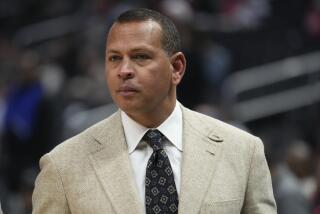Reports link Glaus and Ankiel to drugs
- Share via
On a day baseball’s steroid investigator pleaded with players to talk to him, Troy Glaus of the Toronto Blue Jays and Rick Ankiel of the St. Louis Cardinals became the latest athletes alleged to have ordered performance-enhancing substances from a Florida pharmacy at the center of a national investigation into Internet drug trafficking.
Glaus, the most valuable player in the Angels’ 2002 World Series victory, was reported Friday to have received multiple shipments of steroids in 2003 and 2004, prescribed by a Tustin physician since disciplined by the state medical board.
Ankiel, who reinvented himself as a prodigious slugger after control problems so severe he abandoned a once-promising major league pitching career, was reported to have received multiple shipments of human growth hormone in 2004.
The commissioner’s office plans to investigate the reports and could interview Glaus and Ankiel, although a suspension for either is unlikely. That probe would be independent of the one begun 19 months ago by former Sen. George Mitchell, on behalf of Commissioner Bud Selig.
Mitchell has said his investigation is in its “final stages,” but he cannot compel players to cooperate with him. Union officials have warned players that information given to Mitchell could be used against them, in possible legal action or baseball discipline. Nonetheless, in a letter received by players Friday, he asked players to volunteer any information that could be used in reconstructing how steroids infected baseball.
“I didn’t read it,” said San Francisco Giants shortstop Omar Vizquel. “I don’t care about steroids letters. I just throw them away.”
Said the Dodgers’ Nomar Garciaparra: “They’re wasting money.”
Glaus and Ankiel are alleged to have received drugs from Signature Pharmacy, an Orlando, Fla., firm raided in February. The Albany (N.Y). County district attorney has focused on Signature in an investigation into illegal drug sales via the Internet, with prescriptions reportedly funneled there from doctors in several states, including New York, Florida, Texas and California.
The Glaus report, posted on Sports Illustrated’s website, SI.com, alleged the third baseman received prescriptions for nandrolone and testosterone in his name and had them sent to an address in Corona, where he owns a home. The anabolic steroids were banned by baseball at the time, but players were not tested for them until 2004 and not punished or publicly identified after a positive test until 2005.
According to the report, Glaus received the prescriptions from Ramon Scruggs, a physician at the New Hope Health Center in Tustin. The state medical board put Scruggs on probation in March, part of a settlement after a board complaint that he “prescribed approximately 6,073 prescriptions of dangerous drugs or controlled substances over the Internet without a good faith examination of the patients.”
The New Hope website advertises “therapy” through human growth hormone, testosterone and anabolic steroids.
“Anabolic steroids have been widely demonized by an uninformed media as a result of their abuse by athletes seeking to gain an edge on their competition,” a page on the website reads.
A woman who answered the phone at New Hope on Friday afternoon said of Glaus: “He is not even our patient. We have nothing on him in our database.” The woman, who would not give her name, added that Scruggs was “with a patient” and said, “If he does call you back, he’ll be a little irate.”
Scruggs did not call back. Glaus walked past reporters seeking comment before Friday’s game between the Blue Jays and Tampa Bay Devil Rays in St. Petersburg, Fla.
The report says the shipments occurred between September 2003 and May 2004, when Glaus was still with the Angels. He suffered a shoulder injury in July 2003 and did not play again that season. After a winter of therapy did not resolve the injury, he underwent surgery in May 2004. He returned in August and finished the season as a designated hitter.
Glaus has the only 40-homer seasons in club history -- he hit 47 in 2000 and 41 in 2001 -- but the Angels did not offer him a new contract after the 2004 season. They handed third base to rookie Dallas McPherson.
Glaus signed a four-year, $45-million contract with the Arizona Diamondbacks and was traded to the Blue Jays one year later.
Angels General Manager Bill Stoneman said Friday’s report “comes as a total surprise.” He and Angels Manager Mike Scioscia each said the team had no reason to suspect Glaus used steroids and said concern about possible steroid use played no role in the decision to let Glaus go.
“We weren’t really sure if Troy was going to be able to play third base again,” Scioscia said.
Two of Glaus’ teammates with the Angels, outfielder Garret Anderson and pitcher Scot Shields, declined to discuss the report.
“I don’t talk about things that are none of my business,” Anderson said.
The Ankiel report, in the New York Daily News, alleged he received eight shipments of human growth hormone during 2004, including injectable drugs sold under the names saizen and genotropin. The latter drug was the same one allegedly sent to Angels outfielder Gary Matthews Jr. in 2004, when he played for the Texas Rangers, according to SI.com.
Ankiel confirmed Friday he had picked up drugs at that time from a Florida clinic cited by the Daily News, during his recovery from Tommy John surgery, and took them under a doctor’s orders. He initially acknowledged human growth hormone was one of those drugs, then backed off.
“I’m not going to go into the list of what my doctors have prescribed for me,” Ankiel told reporters in Phoenix before the Cardinals played the Arizona Diamondbacks. “I’ve been through a lot emotionally and physically. There are doctor and patient privileges, and I hope you guys respect those privileges.”
Human growth hormone was not banned under baseball rules at the time. Baseball has since forbidden the use of HGH but does not test for the substance, claiming no reliable test exists.
--
Times staff writer Dylan Hernandez in San Francisco contributed to this report.
lance.pugmire@latimes.com
More to Read
Go beyond the scoreboard
Get the latest on L.A.'s teams in the daily Sports Report newsletter.
You may occasionally receive promotional content from the Los Angeles Times.








